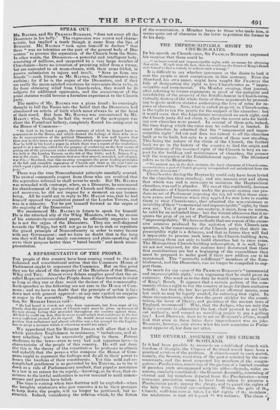THE IMPRESCRIPTIBLE RIGHT TO CH URCH-RATES.
IN his speech on Church-rates, Sir FRANCIS Buenera. expressed his surprise that there could be
" an immemorial and impreperiptilde right, with no means for obtaining
that right. If such were the fact, then he would say the Court of King's Beach were hound to rind a remedy to redress such a wrong." It is difficult to say whether ignorance or the desire to lord it over the people is most conspicuous in this sentence. Even the Standard, his own paper, might have taught Sir FRANCIS the fully of designating the right to levy Church-rates as " impre- scriptible and immemorial." On Monday evening, that journal, after referring to former arguments in proof of the antiquity and inviolability of the property of the Establishment in Church-rates, virtually destroyed the whole force of those arguments by proceed- ing to quote modern statutes authorizing the levy of rates for re- pairs of churches. Now, what is called property in Church-rates, is the right to tax the people for the support of the churches: but it would seem that the Legislature recognized no such right, and the Church party did not claim it, when the recent acts for build- ing new churches were passed. In several of these acts, indeed,
the time during which the rates may be collected is limited. It must therefore be admitted that the " immemorial and impre-
scriptible right" did not and does not extend to all the churches built or to be built, but only to a portion of those now standing. This being, the nature of the claim of the Church, the further back we go in the history of the country to find the origin and establishment of the assumed right of the Church to levy an im- post for the building and maintenance of churches, the grosser will the usurpation of the Establishment appear. The Standard refers us to the Heptarchy- " We pointed out, in the first instance, the legal character of Church-rates, as constituting a part of Church property unimpeached and unforfeited from the Ileptarchy downward."
Church-rates during the Heptarchy could only have been levied
for the churches then standing; and any amount over and above that which was and is necessary to maintain the Ileptarchical churches, was and is plunder. We assert this confidently, because
the advocates of Church-rates under the present system can pro- duce no act of Parliament imposing the tax till within these nine- teen years, and because when they applied for new laws to enable them to raise Church-rates, they admitted the non-existence or invalidity of their " immemorial and imprescript ible" right, by their own act. Yet, if good for one century, it must, from its nature, be valid for an unlimited time : but the virtual admission that it re- quires the prop of an act of Parliament now, is destructive of its " imprescriptibility." We have no doubt that one reason of the exces-
sive soreness produced by the agitation of this Church-rate question, is the consciousness of the Church party that their im- prescriptible right is a delusion, and that in future they will find it impossible to procure such laws as the Church-building Acts, authorizing, them not only to build churches but to raise rates. The Metropolitan Church-building subscription, it is said, lags : we are not surprised, for the zealous have discovered that their first contributions are but a beginning of the expenditure they must be prepared to make good if their new edifices are to be maintained. The "genteelly indifferent" members of the Esta- blishment, and the Dissenters, can no longer be compelled to sup- port them.
So much for rime %iiiue of Sir FRANCIS BURDETT'S " immemorial and imprescriptible right," even supposing that he could prove its
existence. One word as to the duty he would impose on the Court of King's Bench. It appears that a certain portion of the com- munity claim a right to tax the couutry at large for their exclusive benefit ; but that the law has provided no effectual means, none but such as may be legally evaded, for enforcing that right. In these circumstances, what does the great stickler for the consti- tution, the lover of liberty, and guardian of the ancient laws of
England, recommend? Why, that the Judges, who are only the King's servants to administer the law, shall proceed to act with- out authori.y, and compel an unwilling peop'e to pay a galling tax ! Lord DENMAN, were he to act on Beeniser's advice, would find that even in these latter days impeachment was no joke. BURDETT, however., only avows what his new associates in Parlia- ment approve of, but dare net utter.


























 Previous page
Previous page